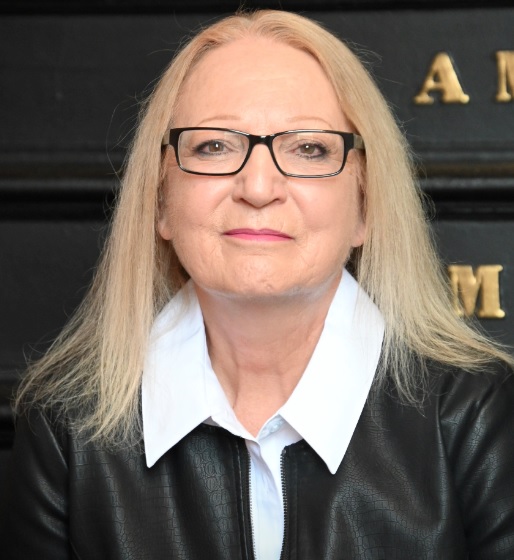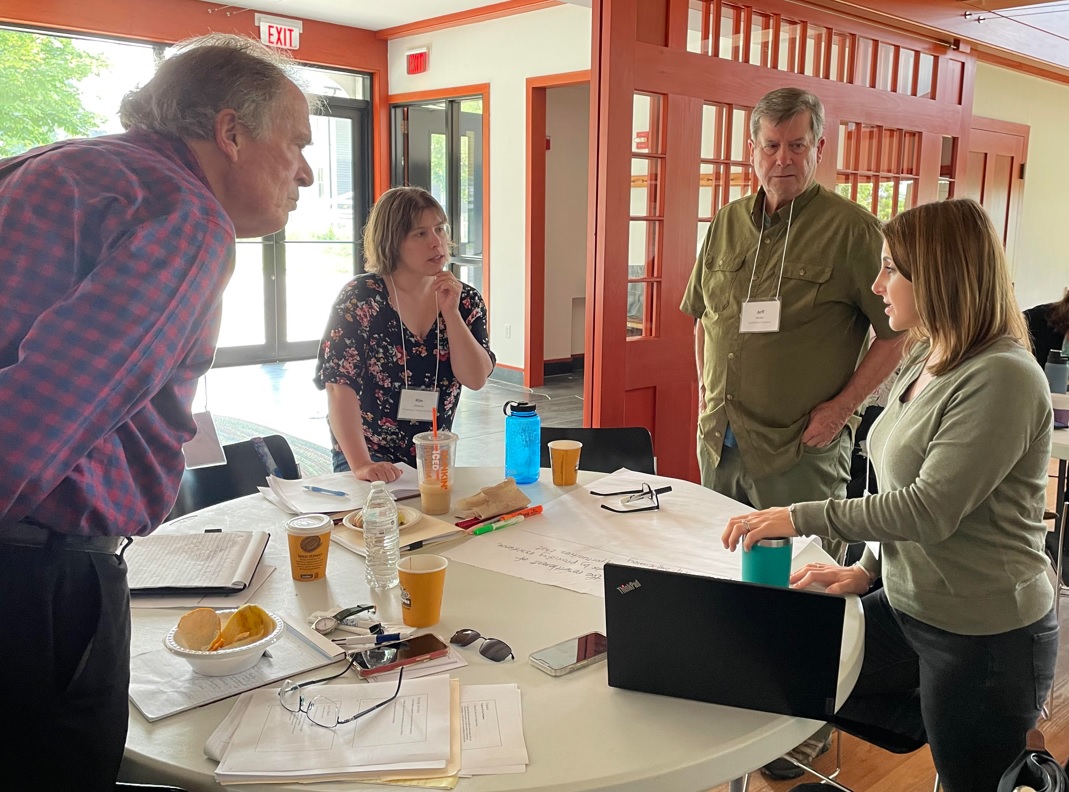Attendees of the Institute work on the Logic Model. From L to R: Clint Swift, Maxfield Parrish Stage Set, Kim Simmons, Portsmouth Historical Society, Jeff Binder, The Gundalow Company, and Emily Filiano, Organization for Refugee and Immigrant Success.
For three days, forty-five New Hampshire nonprofit organization members learned the ins and outs of grants, the lifeblood of nonprofits. These funds help allow them to exist and serve the people of New Hampshire. The New Hampshire Center for Nonprofits, whose mission “strengthens and gives voice to the state’s nonprofit sector through leadership, collaboration, and learning opportunities,” presented the NH Grants Institute. The Institute was held at the Hubbard Gallery in the beautiful and historic Canterbury Shaker Village.
Betsy McNamara, CFRE and Principal of Full Circle Consulting, was ably tasked with guiding the group, which was a mix of very experienced grant writers as well as those who had just begun learning the process, through the three days of talks by experts in the field as well as running the panels comprised of funders called, Voices in Philanthropy. She welcomed the group on the first day with the agenda, including learning about who makes the grants, how to understand the grant process from the funder’s perspective, and the nuts and bolts of writing a proposal. On day three, McNamara skillfully guided the group through the IRS Form 990 by winnowing it down to the key places to review. She talked about the reason for the Institute.
“The NH Grants Institute was created to help nonprofits successfully fulfill their mission. We cover how to research grant opportunities, how to make the case for support, and how to present that case for support in your budget. We also talk about when grant funding is not the best option. The most popular part of the workshop is the lunchtime funders panel in which nonprofit staff and board ask questions of funders.”
Keryn Kriegl, Project and Relationship Manager for the New Hampshire Center for Nonprofits, shared their objective to clarify who reads the grants for the attendees. “We are interested in building the capacity of New Hampshire’s nonprofits. In particular, we want them to be able to raise the funds that they need to fulfill their missions. The grants institute is one of these opportunities that we make available each year. And our goal is to help people know where funding comes from, what different types of funding there is, and how to put together a proposal that would be attractive and of interest to the people who are reading the proposals. What we’ve been learning from our panels is that sometimes it’s staff people, sometimes it’s board members, and sometimes it’s the community reading these proposals. So you really have to understand this wide variety of people with different levels of skills and interests that will be reading those proposals and to make it concise and clear and compelling.”
The panels were made up of industry leaders and decision-makers each day. The panelists included Anne Phillips, NH Charitable Foundations, Nichole Martin Reimer of the Granite United Way, Kelli Rafferty of the Mary & John Elliot Charitable Foundation, Michael Vazquez from Citizens, Todd Fahey of the Madelaine G. von Weber Trust, Kim Firth, Endowment for Health, Tanna Clews of the NH Women’s Foundation, Hayley Dunn with Eversource, and Jack Frost from the Bar Harbor Bank & Trust.
Melissa Nemon, Ph.D., owner and founder of Nemon Consulting LLC, a community-based impact, assessment, and evaluation consultant, was asked to explain “The Logic Model.” She led the group through the five phases that identified the goal, the inputs, the activities, the outputs, and finally identify the outcomes.
Budgeting was the word for day three, where Sue Fulton, CFO of the Endowment for Health, talked about budgeting tips for direct and indirect expenses and in-kind and narrative tips. She presented examples of a poorly written budget and single and multi-year budgets.
The last item on the packed agenda turned the tables on the attendees by making them act as funders and had them review three grants and choose if and how they would fund the nonprofits. For more information, go to www.NHNonprofits.org.

Beverly Stoddart is a writer, author, and speaker. After 42 years of working at newspapers, she retired to write books. She is on the Board of Trustees of the New Hampshire Writers’ Project and is a member of the Winning Speakers Toastmasters group in Windham. She is the author of Stories from the Rolodex, mini-memoirs of journalists from the 1960s, 1970s, and 1980s.






